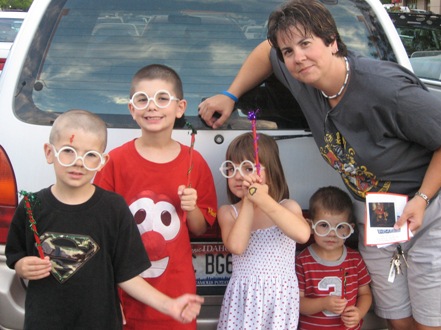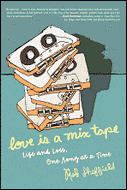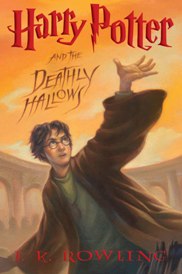 Cracked this open for the first time last night, shortly after my shift started. At 6:25, when I had to take care of some end-of-shift chores, I had 100 pages left.
Cracked this open for the first time last night, shortly after my shift started. At 6:25, when I had to take care of some end-of-shift chores, I had 100 pages left.
100 pages!!!
My kingdom for another 40 minutes!

 Cracked this open for the first time last night, shortly after my shift started. At 6:25, when I had to take care of some end-of-shift chores, I had 100 pages left.
Cracked this open for the first time last night, shortly after my shift started. At 6:25, when I had to take care of some end-of-shift chores, I had 100 pages left.
100 pages!!!
My kingdom for another 40 minutes!
Betcha can’t guess why we were there…

(Obviously, it was the large Magic Tree House display in the kids’ section that drew us)
(well, didn’t actually spend the money–didn’t have it–but I have a huge shopping list now)
Every time I have a crush on a woman, I have the same fantasy: I imagine the two of us as a synth-pop duo. No matter who she is, or how we meet, the synth-pop duo fantasy has to work, or the crush fizzles out. I have loads of other musical fantasies about my crushes—I picture us as a Gram-and-Emmylou country harmony duo, or as guitarists in a rock band, trading off vocals like Mick and Keith. But for me, it always comes back to the synth-pop duo. The girl is up front, swishing her skirt, tossing her hair, a saucy little firecracker. I’m the boy in the back, hidden behind my Roland JP8000 keyboard. She has all the courage and star power I lack. She sings our hit because I would never dare to get up and sing it myself. She moves the crowd while I lurk in the shadows, lavishing all my computer-blue love on her, punching the buttons that shower her in disco bliss and bathe her in the spotlight. I make her a star. . . .
It’s odd that I’ve never pictured myself as a solo rock star. I’ve always dreamed of a new wave girl to stand up front and be shameless and lippy, to take the heat, to teach me her tricks, teach me to be brace like her. I needed someone with a quicker wit than mine. The new wave girl was brazen and scarlet. She would take me under her wing and teach me to join the human race, the way Bananarama did with their “Shy Boy.” She would pick me out and shake me up and turn me around, turn me into someone new. She would spin me right round, like a record.
 If any part of that selection resonates with you in any way, or if you just like reading insightful men talk about their love for their wives. Then you need to read Rob Sheffield’s Love Is a Mix Tape: Life and Loss, One Song at a Time. Sheffield is a music critic for Rolling Stone, and this, his first book, is a chronicle of his time with his wife, Renée, from their meeting to her untimely death at the age of 31. But he doesn’t tell the story straight, no sir. He frames his account in discussions of mix tapes he or she made for various times/events in their lives. The songs, and the feelings they evoke, are just as much part of their story as anything else.
If any part of that selection resonates with you in any way, or if you just like reading insightful men talk about their love for their wives. Then you need to read Rob Sheffield’s Love Is a Mix Tape: Life and Loss, One Song at a Time. Sheffield is a music critic for Rolling Stone, and this, his first book, is a chronicle of his time with his wife, Renée, from their meeting to her untimely death at the age of 31. But he doesn’t tell the story straight, no sir. He frames his account in discussions of mix tapes he or she made for various times/events in their lives. The songs, and the feelings they evoke, are just as much part of their story as anything else.
I have built my entire life around loving music, and I surround myself with it. I’m always racing to catch up on my next favorite song. But I never stop playing my mixes. Every fan makes them. The times you lived through, the people you shared those times with—nothing brings it all to life like an old mix tape. It does a better job of storing up memories than actual brain tissue can do. Every mix tape tells a story. Put them together, and they add up to the story of a life.
Before he really dives into the story of his life with Renée we are treated to some fun writing–like his taxonomy of mix tapes (e.g., “The Party Tape,” “Road Trip,” “You Broke My Heart and Made Me Cry and Here are Twenty or Thirty Songs About It”) and the story of picking the music for a school dance at 13 (which starts with the killer opener: “Like a lot of stories, this one begins, ‘I was too young to know better.’ Like a lot of stories that begin ‘I was too young to know better,’ this one involves Cheap Trick.”) In these opening chapters, we get a feel for who Rob Sheffield is, his humor, his love for music, how it’s shaped his reactions to life (or at least his descriptions of his reactions).
And then things swing into high gear. He meets, falls in love with, marries and learns to live with Renée. And we really get to know Rob as he gets to know her. He describes the night they started to fall in love:
I could feel serious changes happening to me the longer I stayed in Renée’s room. I felt knots untie themselves, knots I didn’t know were there. I could already tell there were things happening deep inside me that were irreversible. Is there any scarier word than “irreversible”? It’s a hiss of a word, full of side effects and mutilations. Severe tire damage—no backing up. Falling in love with Renée felt that way. I felt strange things going on inside me, and I knew that these weren’t things I would recover from. These were changes that were shaping the way thing were going to be, and I wouldn’t find out how until later. Irreversible.
Even if you hadn’t read the book jacket to know what happens to Renée, Sheffield litters the early chapters of the book with references to her death. But you’re still unprepared for it when it comes. Not as unprepared as he was, but enough that it jars. At this point, he’s drawn you enough into his life that you can’t help but feel for him in his pain. Those were real tears I had to try to read through (glad all the clients at work were asleep at 3:30 am) as he described calling their mother’s on Mother’s Day to tell his tragic news, or the way that he kept expecting her to call him and tell him she was coming home.
This isn’t just about their relationship, you cannot escape music in these pages. (you could also say, the book isn’t just about music, you cannot escape their relationship in these pages). Pop music is just ubiquitous in Sheffield’s world–references to songs, lyrics, performers, labels…it’s all there as part of the warp and woof of his reality, giving the account a larger, yet more accessible scope. Some of that will stay with me as long as the relationship story. Not unlike when I read Hornby’s About a Boy, his reaction to the suicide of Kurt Cobain really struck me.* I wasn’t a Nirvana fan–it’s only recently that I can say I appreciated much of their music–but reading Sheffield, I wished I had been a fan so I could’ve experienced things the way he did. Beyond the reaction to Cobain’s death, his discussion of Nirvana’s work helped me to see it in a way that even now (maybe especially now), I can appreciate it for what it was.
Funny, touching, poignant, well-written, moving. (am getting redundant there…sure sign of a post that’s gone on too long) One of the best books I’ve read this year–one of the better books I’ve read in recent years.
Grade: A+
* The total absence of this in the movie is why, no matter how nicely made the film was or how many awards it received, About a Boy was a total failure.
We all have the ability to really freak ourselves out over nothing–a wrong number in the middle of the night, strange yet ultimately benign noises in the house, having to repeat routine blood tests, and so on.
Last night I’m reading a detective novel about a serial killer–I’d read it before, back when the Love of My Life was expecting Samwise and was too uncomfortable to sleep in our bed. Which worked out well this one evening. The depiction of the …evil, the insane (literally) depravity had set me on edge. I vividly remember, sitting on my bed not taking my eyes from the page, leaning forward as I read, as if that’d speed things along. It’s incredibly rare for a book to affect me like that, I wasn’t scared–but I was downright close. When I finally finished the book between 4 & 5 am (371 pages of tense prose and tiny type in one sitting), I went out to the living room, confused my wife by giving her a big hug and went to bed to catch a little sleep before work–purposely leaving all the lights on in the room.
So last night, I’m rereading the same book for the first time, and it’s starting to grip in in a similar way–but not as completely as before. About the time that the author really begins to reveal the nature of the killer–later described as “a creature beset by what Coleridge called ‘motiveless malignancy'”–I start remembering that night 8 years ago, details from the end of the book, and so on. This gives me a sort of detachment from the book. And as I realize this detachment’s existence, I feel a bit of relief.
And then, over my headphones comes the lighting strike of Kirk Hammett’s guitar, the staccato thunder of Lars Ulrich’s drums, and James Hetfield’s guttural vocals
Darkness imprisoning me
All that I see
Absolute horror
Frak.
I put a finger in the book to hold my place, walked across the room…
and turned on another light.
“Ooooooooooooooooooooooooooooooooohhhhhh!”
Deathly Hallows cover released (a wrap around!).

Click here for a full image, and non-US covers.
 I’ve set aside most of my current reading because Robert Crais just released his latest, The Watchman. I will admit that I was very nervous about this book heading into it, because this is being billed as “The First Joe Pike Novel.” I just didn’t think the idea would work. Instead of the focus being on his partner, Elvis Cole, this time we’re treated to seeing things from Pike’s POV (thankfully not told in first person, because I really don’t think that’d work at all). I’m glad Parker has decided to not write a Hawk novel, Stout writing from Wolfe’s perspective wouldn’t have been the same (we need Archie in order to like his boss), LeHane having Patrick and Angel play second-fiddle to Bubba would just be scary.
I’ve set aside most of my current reading because Robert Crais just released his latest, The Watchman. I will admit that I was very nervous about this book heading into it, because this is being billed as “The First Joe Pike Novel.” I just didn’t think the idea would work. Instead of the focus being on his partner, Elvis Cole, this time we’re treated to seeing things from Pike’s POV (thankfully not told in first person, because I really don’t think that’d work at all). I’m glad Parker has decided to not write a Hawk novel, Stout writing from Wolfe’s perspective wouldn’t have been the same (we need Archie in order to like his boss), LeHane having Patrick and Angel play second-fiddle to Bubba would just be scary.
But so far, I’m really enjoying this book. I could easily have finished it in one sitting–but am forcing myself to take a week or so to work through it. Lovin’ this thing. Mr. Crais, sorry for doubting you.
Last few trips to the library, I’ve been dipping into the Leo Waterman mysteries by G. M. Ford. They don’t carry the interestingly titled debut, Who in Hell is Wanda Fuca?, so I started with Cast in Stone and The Bum’s Rush, the second and third entries. While I can’t say that I’ve been blown away by them, or addicted to the characters, I’ve definitely enjoyed my time with Leo. And then we come to the fourth installment, Slow Burn–and Ford earns me as a loyal reader.  I still might not rush to get him like I would say, Levine or Butcher (my two favorite “finds” of ’06), but I will read anything by him I find.
I still might not rush to get him like I would say, Levine or Butcher (my two favorite “finds” of ’06), but I will read anything by him I find.
Why’s that? Because while telling a pretty entertaining story and developing the characters naturally, but clearly; Ford reveals himself to be (like myself) an unabashed Nero Wolfe fan. He blends in direct references, subtle references and an homage or two to “my favorite fatty” (to quote Archie Goodwin) seamlessly into his story. Now, if you have no idea who Wolfe is–or only a passing knowledge–it won’t make a difference to the story, you still get Leo and his crew of homeless operatives cracking an interesting case in their inimitable fashion. But if you know that the hours of 9-11 and 4-6 belong to the plant rooms, and are not to be violated; you have always wanted to drink a bottle or two of Remmers beer; beam at being told something is “satisfactory” (want to do backflips when told “very satisfactory”); and have ever averred “contact is not a verb in this house;” well then–this book is so much more than Leo and the boys.
There’s the client–Sir Geoffrey Miles–who in bulk, mannerisms, and appetite is clearly Wolfe (though he pronounces the interjection “phooey”). Miles’ butler, Rowcliffe, who owes his name, but certainly not his attitude to the Lieutenant from Homicide. The plot tips it’s cap to both Too Many Cooks and Some Buried Ceasar, two of the most popular Wolfe novels. And at the end there are some direct references made by Leo to Mr. Wolfe. There’s quite likely even more than that (oh, like the book’s dedication), but that’s enough for now. The suspects themselves could’ve appeared in the yellow chairs in Wolfe’s office.
I just loved that. Now, Kinky Friedman tried this in one of his earlier novels. But it didn’t work quite as well. It felt forced, sometimes even tacked on. Ford’s doesn’t.
Again, that’s just one part of the novel–it is more than just a Wolfe Geek trip. There’s a decent murder, there’s the Rebecca-Leo banter, a quick visit from Hector, the ex-ACLU lawyer, the strange family connections that open every door Leo needs, etc., and some very funny scenes. Well worth the read.
Oh, for the .5 of you who might’ve read this far–a back cover blurb on an earlier Ford novel welcomed Leo Waterman to the ranks of fictional Seattle PI’s (or words to that effect). There are other Seattle PI’s? Anyone know who? Sure, Gideon Oliver’s based out of UW, but I can only think of one case of his in Washington–and that wasn’t in Seattle.
from Sci Fi Wire:
J.K. Rowling announced on Dec. 21 the title of her upcoming seventh and final Harry Potter book: Harry Potter and the Deathly Hallows, according to her British publisher, Bloomsbury. The publication date has not been set, though it’s expected in 2007.
Deathly Hallows? uhhh. oookay. If you ask me, it doesn’t have the ring of and the Sorcerer’s/Philosopher’s Stone; …and the Chamber of Secrets; …and the Prisoner of Azkaban; or …and the Goblet of Fire.
Ah well…who cares what it’s called? It’s one step closer to being here!!
It’s only just beginning to occur to me that it’s important to have something going on somewhere, at work or at home, otherwise you’re just clinging on. If I lived in Bosnia, then not having a girlfriend wouldn’t seem like the most important thing in the world, but here in Crouch End it does. You need as much ballast as possible to stop you from floating away; you need people around you, things going on, otherwise life is like some film where the money ran out, and there are no sets, or locations, or supporting actors, and it’s just one bloke on his own staring into the camera with nothing to do and nobody to speak to, and who’d believe in this character then? I’ve got to get more stuff, more clutter, more detail in here, because at the moment I’m in danger of falling off the edge.
– Nick Hornby, High Fidelity
Powered by WordPress & Theme by Anders Norén